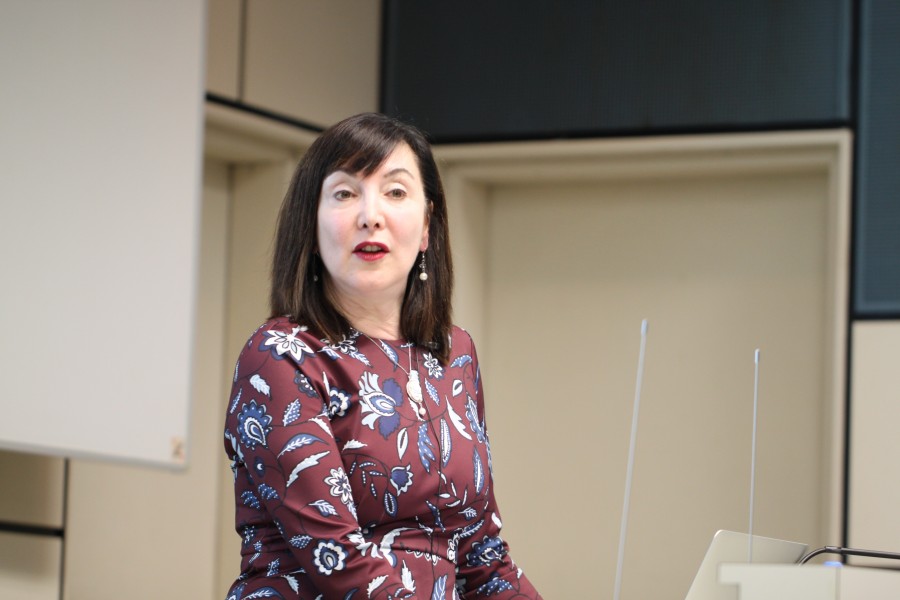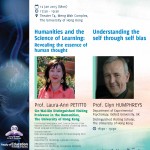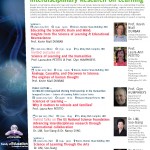Invited Lecture —
Sin Wai-Kin Distinguished Visiting Professorship in the Humanities
Humanities and the Science of Learning: Revealing the essence of human thought

Sin Wai-Kin Distinguished Visiting Professor in the Humanities, The University of Hong Kong;
Full Professor, Department of Psychology, Gallaudet University, Washington, D.C. USA
This lecture is supported by Sin Wai-Kin Distinguished Visiting Professorship in the Humanities. It is also one of Winter Institute 2015 activities.
Abstract
The disciplines of Neuroscience and Education are infused with the Humanities and provide new answers and two-way enrichment among the disciplines. In my laboratory, I have conducted research on the reading brain, the dancer’s brain, the bilingual brain, the limits and great expanses of the “neurally plastic” brain, the chimpanzee’s brain, and the “silent” brain: What happens when the lion’s share of knowledge comes in through the human eye instead of through the human ear? What does visual poetry look like? How does the decoding of print on the page in alphabetic languages proceed when there is no sound? Here, the discovery of the existence of Visual Sign Phonology as the gateway to reading has radically altered our conception of language as being tied to speech. Does the learning of dance – that is, learning in the classical Arts – afford cognitive benefits to the young child’s learning of other domains of knowledge that have nothing to do with dance or the Arts. The answer is yes it does! The benefits of learning the Arts render profound higher cognitive benefits to human learning and thinking in ways we never before knew possible. The Humanities and the neurosciences ultimately seek answers to common questions. Yet each does so using different methods. While we carve up these disciplines and their methods in distinct ways, the human brain does not. By joining forces, the Humanities, Neuroscience, and Education can vastly refine our understanding of, for example, the structure of the human story (both our public and private narratives) and the structure of human thought (especially social and cultural thought). This union of disciplines provides new perspectives on why we organize history around collective thoughts about past events, or explore the power of literature to represent consciousness. To be sure, the discipline called the Science of Learning/Educational Neuroscience helps us combine these seemingly disparate types of knowledge together in ways that lay bare the essence of human thought, reasoning, memory, morality, ethical conduct, and aesthetics, and, ultimately, what it means to human.
About the speaker
Professor/Dr. Laura-Ann Petitto
Co-Principal Investigator, and, Science Director of the
National Science Foundation, Science of Learning Center,
Visual Language and Visual Learning (VL2).Scientific Director: Brain and Language Laboratory for Neuroimaging (BL2)
Full Professor: Department of Psychology, Gallaudet University
Affiliated Full Professor: Department of Psychology, Georgetown University
Washington, D.C. USA
Web page: http://www.gallaudet.edu/petitto.html
Professor Laura-Ann Petitto, a Cognitive Neuroscientist, is the Co-Principal Investigator, and Science Director, of the USA’s National Science Foundation’s Science of Learning Center, “Visual Language and Visual Learning, VL2” at Gallaudet University. She is also a Full Professor in the Department of Psychology at Gallaudet, an affiliated Full Professor in the Department of Psychology at Georgetown University, and the Scientific Director of her own Brain and Language Laboratory for Neuroimaging. Petitto is known for her role in the creation of the new discipline Educational Neuroscience, and she is one of the Co-Founders as well as Chair of the Steering Committee of the PhD in Educational Neuroscience program at Gallaudet University—the first program of its kind to be created in the United States. Petitto is renowned for her scientific discoveries concerning language and its neural representation in the human brain, how young children acquire language, the shared signed and spoken language processing sites and systems in the human brain, the Bilingual Brain (including sign and spoken bilinguals), and the Reading Brain (including how young signing children use a Visual Sign Phonology en route to deriving meaning from print). Petitto received her Masters Degree in 1981 and Doctoral Degree in 1984 from Harvard University’s Graduate School of Education, Department of Human Development and Psychology (“Psycholinguistics, Language and Cognition Track”). Petitto has won continuous Federal and/or Foundation funding for the past 30 years. She is the recipient of over 35 international prizes and awards for her scientific achievements and discoveries, including the 1998 Guggenheim Award for her “unusually distinguished achievements in the past and exceptional promise for future accomplishment in the Neurosciences.” In 2009, Petitto was appointed a Fellow of the American Association for the Advancement of Science, and a Fellow of the Association for Psychological Science (APS). See http://www.gallaudet.edu/petitto.html




